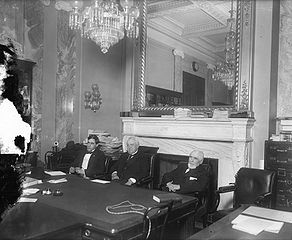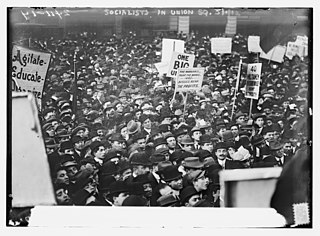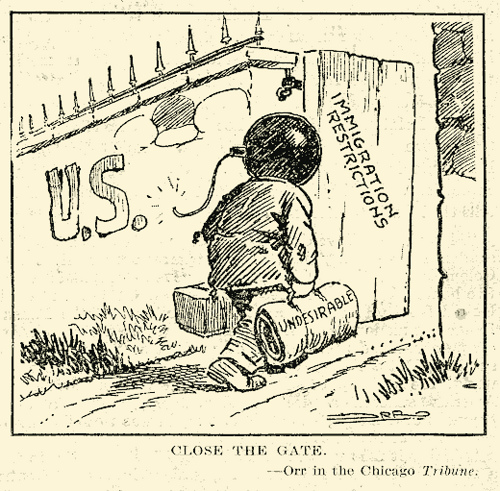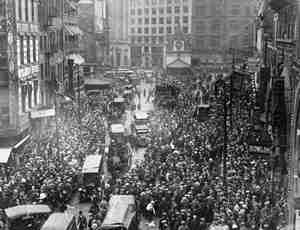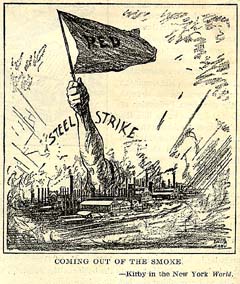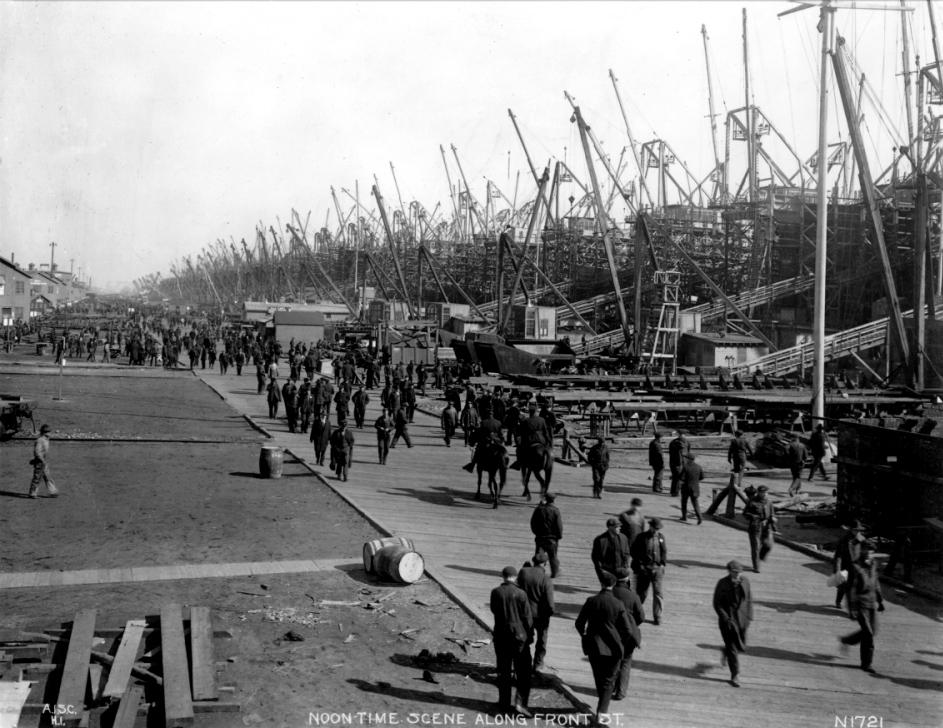The Gloom of the Grave: An Alternate History of 20th Century America
//////////

Chicagoans, naively wondering if the Cubs will win the World Series by 1920
Chicago in 1918 was a charged city. It large German population felt nervous as the nation whipped itself up into a fury against Germany and starting doing mean stuff like renaming the German Measles seem more American. Because god forbid the enemy be associated with a disease. So there was that.
Then, being a big city, there were the godless Commies. Of course some of them weren't actually godless Commies, but there were actually quite a few legitimate Communists across the country, and in a big city like Chicago some were bound to turn up. There were also some bomb throwing anarchists…probably.
Then there were the Blacks who were angry because despite living in the North they still faced poverty, racial slurs and segregation even though Jim Crow was not supposed to go north of the Mason-Dixon Line. Well I guess it did. So yeah they were pissed.
There are other groups to, like the Irish, the Jews and other groups. Some have beef against the system some don't. Most still faced systematic racism from White Anglo-Saxon Protestant majority of the nation. Some bitterly hated it, some were just happy not to be shot in the streets.
In short Chicago (and indeed many large cities) were chock full of people who were angry. Perhaps they were oppressed, perhaps they were just anti-system for the sake of being anti-system. Either way Chicago was one of the closest things America had to a powder keg.
At least the White Sox were good.
~~~~~~~~~~

Lean, mean Bond selling machine
Speeches in the time of war our an age old tradition. The best Roman generals were often great orators who swayed armies with their words. Many a battle has, in the world of adventure at least, been won with a stirring speech to rally the troops. But in the modern era speeches took a slightly less dignified turn, going from battle winning to begging for money.
Of course recruitment was still important and the speakers who crisscrossed the country on behalf of the military, the civilian government and various patriotic groups worked hard to get young men to sign up for the glory in the trenches. So it wasn't all war bonds, but quite a lot of it was basically begging the public to give up money to help pay for the expensive ass war abroad. The speakers at such events were generally local celebrities, athletes, veterans and low level public functionaries. However on occasion a major speaker would be brought in the help boost sales. And it just so happened that in mid-march, somewhat on a whim, President Woodrow Wilson decided to send some high ranking governmental guy to speak in Chicago about how the war must be won by each and every man and how bonds would help every American become a prosperous world power. All of that can still occur to this day if you give your vital life information a this rich Nigerian Prince I met.
In any event Wilson thought that sending a famous person to Chicago would boost bond sales. Despite Teddy Roosevelt jumping up and down saying that he'd recruit a bunch of Chicagoans and lead them to victory Wilson was unswayed. He instead turned to Vice President Thomas Marshall whose vast skills included:
• Winning Indiana
• Witty Phrases for future history nerds
• Generic support for Wilson's overall policy
This wasn't the first time that Marshall was called to do some speaking to rally the pro-war crowd up and convince the undecideds to supported. So he duly got on a train to Chicago to sell him some War Bonds.
Unfortunately for Thomas Marshall, and arguably the Nation, it would be a one way trip.
He was speaking at the huge rally in central Chicago, going on about the need for money and able bodied men to fight the war. Then three shots rang out. One struck the Vice President in the head, another in the chest while the third bullet hit the platform. And all of hell broke loose. Police closed in on the crowd as medics affirmed that the Vice President was dead. Panic began to set in, especially as no one seemed to be able to find the gun. The crowd surged and the police cracked down. Soon countless citizens were being dragged off to jail on various pretenses, many of them of German origin. When the police finally cleared the area they found the gun, tossed aside in a bush. They had no idea who the shooter was. Eyewitnesses gave conflicting descriptions and assessments of the shooter. As the news of the Vice President's death spread rumors followed. Most revolved around a German spy. It didn't help that the crowd on the day of the shooting happened to be heavily German. Soon the rumors included the words "communist" and "anarchist". As the police in Chicago narrowed their investigation down to the incredibly specific "Young, Blue eyes, blond hair, German accent" the furor rise even higher. The already marginalized German minority lashed back against the hysteria in the form of small disturbances. The new Illinois Governor Frank Orren Lowden responded by setting the National Guard on alert. In response to this "mobilization" some anarchists in the city decided to become walking stereotypes and start throwing bombs. It was only a few but it was enough for Lowden to send in the National Guard. This further sent the city into chaos as riots broke out before promptly broke out as Guardsmen lined the streets. Then a massive race riot broke out.
When a young black man was beat to death by overzealous whites for attempting to attend a meeting of socialists. Soon the black neighborhoods of the city were ablaze, sometimes literally, with fighting. Whites had attacked blacks countless times over time and now both races were duking it out. The race riots merged with the general tension on the city to shake the entire Chicago area to its core. "Bleeding Chicago", as the tumultuous events have been called by history. Things got worse when police arrested one Anthony Rauschenberg for the crime of killing Marshall, despite most evidence not pointing towards him
Eventually the National Guard managed to calm things down to a simmering boil but the violence had triggered a wave of paranoia about German and Bolshevik destabilization efforts.
And in Washington the ripples were felt.
Hard.
~~~~~~~~~~
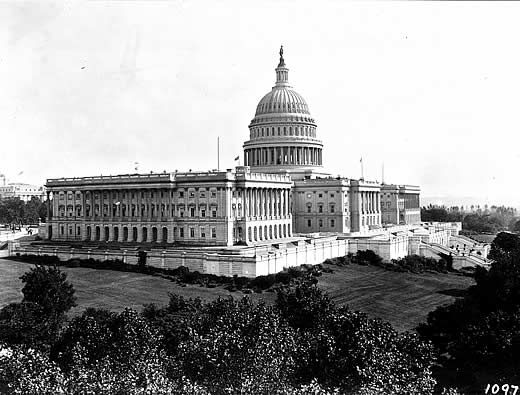
The Capitol Building's Less-Bad Side
In 1917 Congress had passed the Espionage Act which introduced penalties up to and including death for interfering with the war effort. Various parameters were used, and the death penalty was hardly ever used. But many felt it was not enough and pushed for more. And so as Chicago descended into chaos Congress debated the "Sedition Amendments2" a series of changes that came down hard on things the government deemed harmful to the war effort. It gave the government the ability to prosecute any publications or people that used "disloyal, profane, scurrilous, or abusive language3" about the Government or Military. The ability to censor the press was something that Wilson had pushed for during the original passage of the Espionage Act and defeated at, so the President was quite pleased when the Sedition Amendments included a censorship provision. He was less pleased by the so called "Tribunal" clauses in the bill.
Pushed by those who argued that the Department of Justice's enforcement of the acts was not going far enough the Tribunal Clauses set up a series of…wait for it…tribunals. The Tribunals were to be run by the Department of War but have certain changes to accommodate for civilian usage. They would prosecute cases under the Espionage Act and Sedition Amendments if "substantial suspicion" was present that the accused party "had committed or was planning to commit" actions that directly hindered the war effort. What offenses were placed in the category were at the desecration of the local Justice Department officials, who decided what cases were turned over to the war department. Of course this local approach meant that enforcement would vary wildly from place to place. Wilson was concerned about the constitutionality of the provision, among other things, but with the paranoia whipped up by his Vice President's murder Congress shoved the Tribunals into the Sedition Amendments and plopped them on President Wilson's desk. Wilson was torn between wanting to preserve due process and screwing over the free press. Figuring that the Tribunals were only for wartime he went with screwing over the free press and signed the Sedition Amendments.
As mentioned above the enforcement of the new provisions varied wildly across the nation. Sometimes the local Attorneys kept the cases to themselves and other times they were quite happy to dump their workload onto the War Department. It it true that Tribunals had a much higher conviction rate, though their spotty enforcement hindered any generalizations about their effectiveness. In the west, where anti-war groups such as the IWW were active the Tribunals were used the most. However elsewhere they were used less, such as the controversial decision to keep Socialist Eugene Debs in the civilian court system. Some, like Senator Lodge of Massachusetts, objected on the grounds that these provisions violated American liberties. Others, such as Senator Johnson from California, cried because not enough was being done to stamp out attempts to exercise American liberties by traitors. The later group was slightly more numerous. However the vast majority of Americans were vaguely supportive of the measures, but would not weep when they expired. Those who opposed the measures breathed a sigh of relief at said vast majority. After all it would take some horrible stuff in order to get the silent majority to support any long term measures like this.
Evidently those people had never read any work of fiction ever. Because they freakin' jinxed it.
||||||||||
1: Rauschenberg would be sentenced to death eventually, but would have his sentence commuted to life by President [CENSORED] due to evidence issues.
2: Amendments, not Act.
3: As in OTL
Next: Red Scare
The Gloom of the Grave
An Alternate History of the 20th Century
"Your labor is in vain. Nobody was ever crazy enough to shoot at a vice-president. If you will go away and find somebody to shoot at me, I'll go down in history as the first vice-president who ever attracted enough attention even to have a crank shoot at him." Thomas Marshall to a Police Guard in Denver, Colorado
An Alternate History of the 20th Century
"Your labor is in vain. Nobody was ever crazy enough to shoot at a vice-president. If you will go away and find somebody to shoot at me, I'll go down in history as the first vice-president who ever attracted enough attention even to have a crank shoot at him." Thomas Marshall to a Police Guard in Denver, Colorado
//////////

Chicagoans, naively wondering if the Cubs will win the World Series by 1920
Chicago in 1918 was a charged city. It large German population felt nervous as the nation whipped itself up into a fury against Germany and starting doing mean stuff like renaming the German Measles seem more American. Because god forbid the enemy be associated with a disease. So there was that.
Then, being a big city, there were the godless Commies. Of course some of them weren't actually godless Commies, but there were actually quite a few legitimate Communists across the country, and in a big city like Chicago some were bound to turn up. There were also some bomb throwing anarchists…probably.
Then there were the Blacks who were angry because despite living in the North they still faced poverty, racial slurs and segregation even though Jim Crow was not supposed to go north of the Mason-Dixon Line. Well I guess it did. So yeah they were pissed.
There are other groups to, like the Irish, the Jews and other groups. Some have beef against the system some don't. Most still faced systematic racism from White Anglo-Saxon Protestant majority of the nation. Some bitterly hated it, some were just happy not to be shot in the streets.
In short Chicago (and indeed many large cities) were chock full of people who were angry. Perhaps they were oppressed, perhaps they were just anti-system for the sake of being anti-system. Either way Chicago was one of the closest things America had to a powder keg.
At least the White Sox were good.
~~~~~~~~~~

Lean, mean Bond selling machine
Speeches in the time of war our an age old tradition. The best Roman generals were often great orators who swayed armies with their words. Many a battle has, in the world of adventure at least, been won with a stirring speech to rally the troops. But in the modern era speeches took a slightly less dignified turn, going from battle winning to begging for money.
Of course recruitment was still important and the speakers who crisscrossed the country on behalf of the military, the civilian government and various patriotic groups worked hard to get young men to sign up for the glory in the trenches. So it wasn't all war bonds, but quite a lot of it was basically begging the public to give up money to help pay for the expensive ass war abroad. The speakers at such events were generally local celebrities, athletes, veterans and low level public functionaries. However on occasion a major speaker would be brought in the help boost sales. And it just so happened that in mid-march, somewhat on a whim, President Woodrow Wilson decided to send some high ranking governmental guy to speak in Chicago about how the war must be won by each and every man and how bonds would help every American become a prosperous world power. All of that can still occur to this day if you give your vital life information a this rich Nigerian Prince I met.
In any event Wilson thought that sending a famous person to Chicago would boost bond sales. Despite Teddy Roosevelt jumping up and down saying that he'd recruit a bunch of Chicagoans and lead them to victory Wilson was unswayed. He instead turned to Vice President Thomas Marshall whose vast skills included:
• Winning Indiana
• Witty Phrases for future history nerds
• Generic support for Wilson's overall policy
This wasn't the first time that Marshall was called to do some speaking to rally the pro-war crowd up and convince the undecideds to supported. So he duly got on a train to Chicago to sell him some War Bonds.
Unfortunately for Thomas Marshall, and arguably the Nation, it would be a one way trip.
He was speaking at the huge rally in central Chicago, going on about the need for money and able bodied men to fight the war. Then three shots rang out. One struck the Vice President in the head, another in the chest while the third bullet hit the platform. And all of hell broke loose. Police closed in on the crowd as medics affirmed that the Vice President was dead. Panic began to set in, especially as no one seemed to be able to find the gun. The crowd surged and the police cracked down. Soon countless citizens were being dragged off to jail on various pretenses, many of them of German origin. When the police finally cleared the area they found the gun, tossed aside in a bush. They had no idea who the shooter was. Eyewitnesses gave conflicting descriptions and assessments of the shooter. As the news of the Vice President's death spread rumors followed. Most revolved around a German spy. It didn't help that the crowd on the day of the shooting happened to be heavily German. Soon the rumors included the words "communist" and "anarchist". As the police in Chicago narrowed their investigation down to the incredibly specific "Young, Blue eyes, blond hair, German accent" the furor rise even higher. The already marginalized German minority lashed back against the hysteria in the form of small disturbances. The new Illinois Governor Frank Orren Lowden responded by setting the National Guard on alert. In response to this "mobilization" some anarchists in the city decided to become walking stereotypes and start throwing bombs. It was only a few but it was enough for Lowden to send in the National Guard. This further sent the city into chaos as riots broke out before promptly broke out as Guardsmen lined the streets. Then a massive race riot broke out.
When a young black man was beat to death by overzealous whites for attempting to attend a meeting of socialists. Soon the black neighborhoods of the city were ablaze, sometimes literally, with fighting. Whites had attacked blacks countless times over time and now both races were duking it out. The race riots merged with the general tension on the city to shake the entire Chicago area to its core. "Bleeding Chicago", as the tumultuous events have been called by history. Things got worse when police arrested one Anthony Rauschenberg for the crime of killing Marshall, despite most evidence not pointing towards him
Eventually the National Guard managed to calm things down to a simmering boil but the violence had triggered a wave of paranoia about German and Bolshevik destabilization efforts.
And in Washington the ripples were felt.
Hard.
~~~~~~~~~~

The Capitol Building's Less-Bad Side
In 1917 Congress had passed the Espionage Act which introduced penalties up to and including death for interfering with the war effort. Various parameters were used, and the death penalty was hardly ever used. But many felt it was not enough and pushed for more. And so as Chicago descended into chaos Congress debated the "Sedition Amendments2" a series of changes that came down hard on things the government deemed harmful to the war effort. It gave the government the ability to prosecute any publications or people that used "disloyal, profane, scurrilous, or abusive language3" about the Government or Military. The ability to censor the press was something that Wilson had pushed for during the original passage of the Espionage Act and defeated at, so the President was quite pleased when the Sedition Amendments included a censorship provision. He was less pleased by the so called "Tribunal" clauses in the bill.
Pushed by those who argued that the Department of Justice's enforcement of the acts was not going far enough the Tribunal Clauses set up a series of…wait for it…tribunals. The Tribunals were to be run by the Department of War but have certain changes to accommodate for civilian usage. They would prosecute cases under the Espionage Act and Sedition Amendments if "substantial suspicion" was present that the accused party "had committed or was planning to commit" actions that directly hindered the war effort. What offenses were placed in the category were at the desecration of the local Justice Department officials, who decided what cases were turned over to the war department. Of course this local approach meant that enforcement would vary wildly from place to place. Wilson was concerned about the constitutionality of the provision, among other things, but with the paranoia whipped up by his Vice President's murder Congress shoved the Tribunals into the Sedition Amendments and plopped them on President Wilson's desk. Wilson was torn between wanting to preserve due process and screwing over the free press. Figuring that the Tribunals were only for wartime he went with screwing over the free press and signed the Sedition Amendments.
As mentioned above the enforcement of the new provisions varied wildly across the nation. Sometimes the local Attorneys kept the cases to themselves and other times they were quite happy to dump their workload onto the War Department. It it true that Tribunals had a much higher conviction rate, though their spotty enforcement hindered any generalizations about their effectiveness. In the west, where anti-war groups such as the IWW were active the Tribunals were used the most. However elsewhere they were used less, such as the controversial decision to keep Socialist Eugene Debs in the civilian court system. Some, like Senator Lodge of Massachusetts, objected on the grounds that these provisions violated American liberties. Others, such as Senator Johnson from California, cried because not enough was being done to stamp out attempts to exercise American liberties by traitors. The later group was slightly more numerous. However the vast majority of Americans were vaguely supportive of the measures, but would not weep when they expired. Those who opposed the measures breathed a sigh of relief at said vast majority. After all it would take some horrible stuff in order to get the silent majority to support any long term measures like this.
Evidently those people had never read any work of fiction ever. Because they freakin' jinxed it.
||||||||||
1: Rauschenberg would be sentenced to death eventually, but would have his sentence commuted to life by President [CENSORED] due to evidence issues.
2: Amendments, not Act.
3: As in OTL
Next: Red Scare
Last edited:


